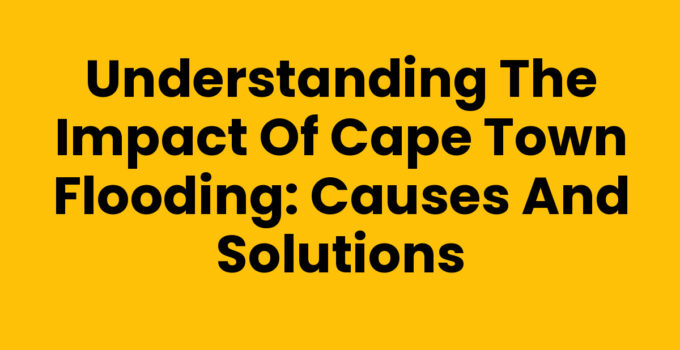Cape Town, known for its stunning landscapes and rich cultural heritage, faces one of the most pressing environmental challenges of our time: flooding. Over the years, heavy rainfall and rising sea levels have caused significant disruptions and damage. This post aims to delve into the causes of Cape Town flooding, its implications, and what measures can be taken to mitigate its effects.
Cape Town Flooding: Causes and Mitigation Strategies
Cape Town flooding can be attributed to a variety of factors, both natural and man-made. Understanding these causes is crucial for formulating effective mitigation strategies. Below is a step-by-step analysis of the primary reasons for flooding in this region, as well as some actionable steps you can take to protect yourself and your property.
Step 1: Understanding Weather Patterns
The first step in comprehending Cape Town flooding involves analyzing the annual weather patterns. The city experiences a Mediterranean climate, characterized by wet winters and dry summers. Extreme weather conditions, such as heavy rainfall during winter months, can lead to flash flooding.
Step 2: Acknowledging Urban Development
Increased urbanization has resulted in more impervious surfaces like roads and buildings, leading to higher runoff rates during heavy rainfall. To counteract this, it’s essential to design and implement better stormwater management systems that allow water to drain effectively.
Step 3: Recognizing Climate Change
Climate change has intensified weather events globally, making Cape Town increasingly vulnerable to severe flooding. More unpredictable rainfall patterns demand immediate action from local authorities and citizens alike.
Step 4: Implementing Green Infrastructure
The city can benefit enormously from green infrastructure solutions like permeable pavements, green roofs, and increased vegetation. These solutions serve to absorb rainwater and slow down runoff. Homeowners can also contribute by creating rain gardens and utilizing water barrels to collect runoff.
Step 5: Developing Emergency Response Plans
It’s essential for residents to be aware of emergency protocols during flooding situations. This includes staying informed through local news and community boards, creating family emergency plans, and preparing emergency kits with essential supplies.
Check This: Your Guide to University Of Cape Town Residence Life
The Impact of Cape Town Flooding on Communities
Flooding in Cape Town has far-reaching effects that extend beyond property damage. Communities face a myriad of challenges when floodwaters rise.
Health Risks
Waterlogged areas become breeding grounds for disease-carrying pests, and contaminated water can lead to serious health risks. Educating communities about these health hazards is vital for public safety.
Economic Hardships
The economic ramifications of flooding can be severe. Businesses may experience closures, and residents may find themselves faced with repair costs or loss of income. Local governments need to implement funds and relief programs to assist affected individuals.
Emotional and Psychological Impact
The emotional toll on affected families cannot be overstated. The trauma of loss and displacement can lead to long-term mental health issues. Community support systems play a crucial role in helping individuals cope with these challenges.
Related Guide: Top Restaurants In Melkbosstrand Cape Town for 2023
Conclusion: Taking Action Against Cape Town Flooding
While Cape Town flooding presents significant challenges, proactive measures can lessen its impacts. By understanding the causes and implementing effective strategies, residents and local authorities can work together to create a safer, more resilient city. Awareness, education, and community action are essential for mitigating the effects of flooding and protecting the beautiful landscapes that make Cape Town unique.
Recommended Reading: Top Restaurants In Cape Town Airport: Dining Options Explained
Frequently Asked Questions
What are the main causes of Cape Town flooding?
Cape Town flooding primarily stems from heavy rainfall, urban development, and climate change.
How can residents prepare for flooding in Cape Town?
Residents can prepare by developing emergency response plans, staying informed, and implementing green infrastructure.
What long-term strategies can help mitigate Cape Town flooding?
Long-term strategies include improving stormwater management systems, increasing vegetation, and community education on flooding risks.



